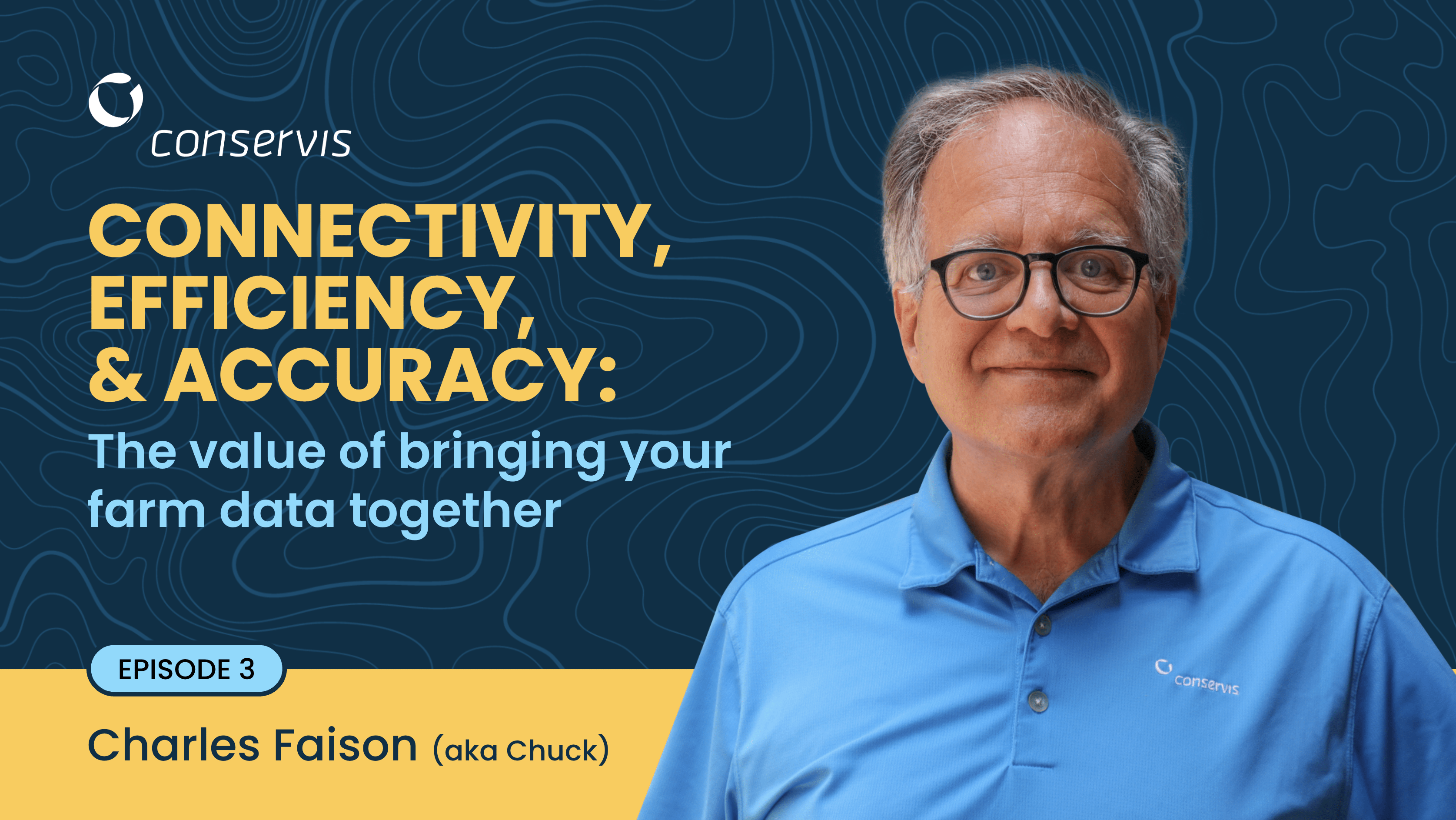
CONNECTIVITY, EFFICIENCY, & ACCURACY:
The value of bringing your farm data together
MARCH 24, 2023
Welcome to Episode 3 of the Conservis Farm Management Webinar! If you’re here, you’re an enthusiast in the corporate or family farm industry, and we’re happy to have you!
In this segment, Charles Faison, Vice President of Solutions at Conservis, presents his thoughts on connectivity, efficiency and accuracy as well as farm management software’s impact on the industry at every step of the way. Conservis has spoken to many farmers and farm managers in the industry, and we’ve learned that there is a crucial connection between accessible information, profitability, and time management.
The health of your business needs to be assessed closely; otherwise, too much of your profitability is left to chance. Why does a farmer use software, how much time does it save, and how does it “connect” them to their crops, their workers, and their customers? Better yet, what does it mean for a farm’s return on investment?
Let’s talk about it!
Core AG-Business Processes
There are seven core business processes to consider from an Operational standpoint:
- Planning
- Input Procurement
- Production Management
- Sales & Risk Management
- Revenue Management
- Green Line Growth & Compliance Reporting (how to use data as an asset in your business)
- Financial & Operational Analysis (how to ensure work is profitable)
Farm Data Silos
Each step of the core businesses processes is crucial, but each runs the risk of siloing themself.
- Some software is specific to a singular silo, and while they are beneficial, they often don’t overlap with other silos.
How do you evaluate workflow without knowing orders? How do you know what to buy without knowing what your plans are? If this information isn’t delegated, your business runs the risk of:
- Duplicating unnecessary information.
- Farm Managers spending too much time communicating rather than working.
- Increased error rates, wasting even more time.
Bringing it All Together
There are three distinct Data Hubs to consider, all of which work together.
- Agronomy Data Hubs: Data collected to meet Chemical & Fertilization Regulations and General Industry Compliance. Scouting, Recommendations, Compliance, and Chemical & Fertilization Regulations all fall within the scope of Agronomy Data Hubs.
- Accounting Data Hubs: Data and information are collected to ensure that people, bills, financial reports, and taxes are addressed. This back-end hub is crucial to ensuring a farm can even operate, to begin with, let alone be profitable.
- Farm Data Hubs: Bridging the gap between Accounting and Agronomy, Farm Data Hubs evaluate information collected from the farms and use it to take action in the most profitable way. Similar to a Project Management system, Farm Data Hubs will look at recommendations and ask what it means for the farm’s budget.
Not all data looks the same, so we’ve broken it down into three integrations:
- Back Office Integration: When exchanging info between the farm office and back office, there is A LOT that needs to be done in a detailed fashion to address the question of profitability and purchasing needs. This workflow prevents overspending when allocating labor and product needs across the entire workflow.
- Field Data Integration: Fundamentally, field data is a different beast for businesses. Innovations in the field need to be brought through to back offices for evaluation.
-
- Information from Mobile Apps, Machine Automation, Irrigation, and Timekeeping (like labor spend)need to be brought to farm hubs as close to real-time as possible so that farmers can take action in problem areas.
- ANY information not being collected by technology is being collected by a human; that’s not exactly the best use of their time!
- Reporting & Analytics Integration: A lot of work needs to be done to cut through the noise so that you can learn from the data you’ve collected. Reporting & Analytics rise above individual transactions to make sense of EVERYTHING. This often comes in the form of a custom report with data collected from independent silos in your workflow on a daily, monthly, or quarterly basis.
Key Takeaways
- Farms have core processes that benefit from connectivity.
- Saving time on the farm creates efficiency and accuracy.
- A data hub leads to better information & even better decision-making.
About Charles Faison
Charles is a Co-Founder of Conservis who currently holds the title of Vice President of Solutions. Charles has vast experience as a technologist, with leadership roles dating back to the 1980s. Charles led the development of Conservis’ first farm management system, and his desire to streamline farm-focused workflows and efficiencies has made him an invaluable asset for farmers everywhere. As Charles puts it, “We’re more than a tech company “We’re a relationship company, too.” With so much valuable data to track, Charles has taken his background and used it for the benefit of farmers everywhere.
Conservis' Purpose:
To be a farmer’s advantage for making decisions, simplifying operations, and maximizing profit. We deliver better insights by centralizing and reporting planning operations and financial data.
Conservis LLC was founded in 2009 and is relied upon by row, specialty, and permanent crop farmers across North America and Australia.
Connect with Conservis:
